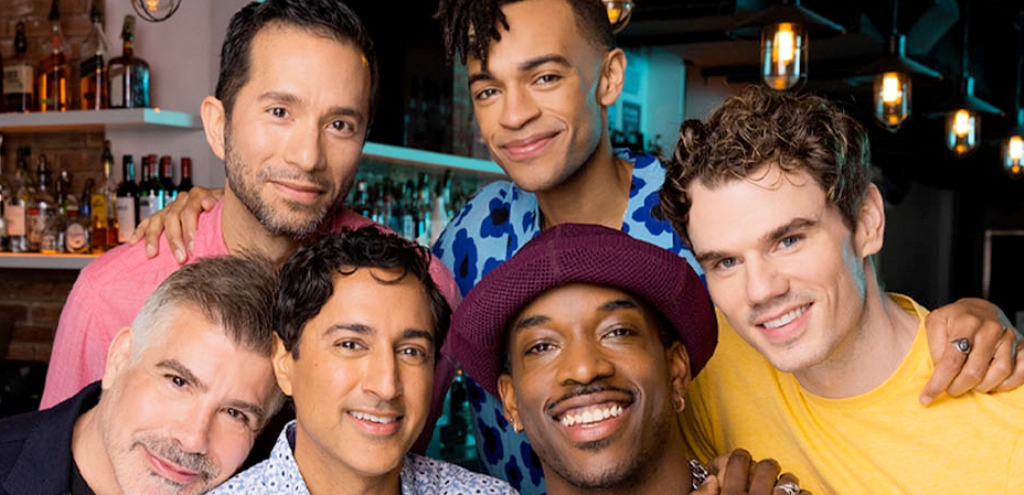TO MY GIRLS
by J.C. Lee
Directed by Stephen Brackett
A Production of 2nd Stage
Tony Kiser Theatre
Reviewed by David Spencer
In 1968, there was The Boys in the Band. In the great tradition of American plays that conflate one from each column gathering with liquor flows, truth revealed plays, it was the primer on existing gay subculture for its time. (And remains a terrific play.)
In 2002 came the less successful sequel, which has never alas played in NYC, The Men from the Boys, set 35 years later. In it, the surviving friends of the original birthday party gather again at Michael’s apartment after the funeral of Larry (the philanderer). In place of the previous play’s two drop-in guests (is-he-straight Alan and prostitute Cowboy), Crowley introduced three much younger men. And a good deal of the play dramatized the rift between them and the older generation, whom they had trouble perceiving as the pioneers whose struggles paved the way toward the more accepting society they currently inhabit. And of course the spectre of AIDS hovered.
(In 2019, Matthew Lopez’s much longer, much more highly plotted play in two parts, The Inheritance handled those and related themes more effectively and multi-generationally, but let’s follow the Crowley paradigm.)
And now we have the archly titled To My Girls by J.C. Lee. This is the boilerplate from the press release: “Is there anything more fabulous than Palm Springs after the end of the world? For one tight group of gay men, a post-pandemic getaway is the perfect chance to reunite, reclaim their time and replace the gloom with some gossip. But as soon as the drinks start pouring, truths start spilling and this chosen family quickly realizes the world has changed. In To My Girls, this group of friends navigate evolving friendships and set things straight…kind of.”
So what’s different? In brief: they’re not closeted, they don’t battle self-loathing (or when they do, it’s not because they’re homosexual), and they camp like crazy. Imagine the party scene in The Boys in the Band when the high-stepping dancing starts, just before Alan walks in on it, not as an interlude but as a sustained state of activity, with skimpy beach wear and even drag-ware. Except for the older gentleman renting the younger ones the house (Brian Batt)—who is just as gay and campy when the mood hits him, but who also remembers how things were; and, shocker, he’s a Republican—all the others are from the even younger generation after the one in The Men from the Boys; often hedonistic and looking for respect and affection; not from the outside world as much as from each other. Oh, and this: regarding the two characters who unavoidably have a more direct ancestral link to the first play: Our hub character is not the manipulator in the Michael slot (Jay Armstrong Johnson); it’s the platonic (but in this case hopeful) friend in the Donald slot (Maulik Pancholy): the self-doubting observer of yore, mostly out of the line-of-fire before, has been transformed into the new play’s beating heart.
I’m not sure how much more I’m qualified to say about the play on a sociological level. Objectively I can say it’s excellently acted (by a cast that also includes Carmen Lacivita and Noah J. Ricketts) and as excellently directed by Stephen Brackett—and that, being mostly a comedy, it succeeds in spades; the audience roars its way through, every joke landing with laugh-machine assurance.
But I have to share an observation that isn’t mine. It came from a colleague and it has kept me thinking. He noted that part of the play’s premise is that new liberation allows camping, dragging, pronoun switching (as in the very title), etc. to be the shameless expression of these men’s real selves. “And yet,” he added, “when things get truly serious, they drop all that, as if it’s not who they really are, and just talk to one another without affectation. That strikes me as condescending.”
I can’t say I agree. I certainly didn’t feel that while watching the play and I haven’t come to it retroactively. But it has made me aware of how little subtext there seems to be in Mr. Lee’s play. Its states of relationship, being and contemporary culture are meticulously explained and confronted with deconstructive psychological precision. Very little is implicit via high context details that allow the audience to intuit things on a deeper level; rather, they’re all spelled out spelled out on a surface level.
But maybe it is indeed the mandate (no pun intended) of a play like To My Girls to be a primer and a manifesto for its generation.
I can’t say.
Maybe we just let this generation—and the ones to follow—decide.
